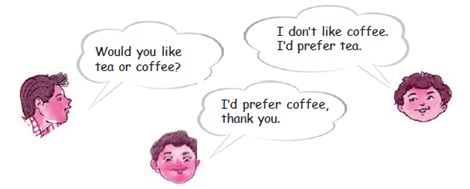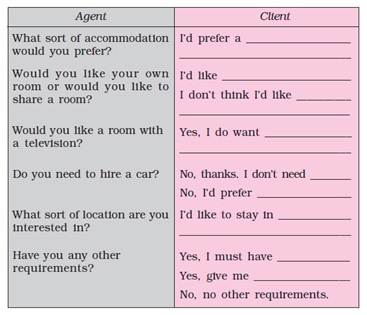NCERT Solutions for Class 6 English Honeysuckle Chapter 8 A Game of Chance
Here the students can find the NCERT Solutions for Class 6 English Honeysuckle Chapter 8 A Game of Chance. The solutions contain questions, answers, explanations and images to all the questions present in the prescribed textbook of CBSE board. All the questions are solved by experts with a detailed explanation that help students to complete their assignments & homework. Students can refer to the Class 6 English NCERT solutions in order to obtain a clear idea of the type of questions that would appear in the annual exams.
NCERT Solutions for Class 6 English Honeysuckle Chapter 8
Working with the Text
Question A. Complete the following sentences from memory choosing a phrase from those given in brackets.
1. ———————— was held at the time of the Eid festival. (A big show, A big fair, A big competition)
Answer: A big fair
2. Tradesmen came to the village with all kinds of goods ——————. (to display, to buy, to sell)
Answer: to sell
3. Uncle told me —————— while he was away. (not to buy anything, not to go anywhere, not to talk to anyone)
Answer: not to buy anything
4. The owner of the Lucky Shop wanted everybody present ———————. (to play the game, to win a prize, to try their luck)
Answer: to try their luck
5. The first time I took a chance I got —————————. (a bottle of ink, two pencils, a trifle)
Answer: two pencils
6. Uncle told me that the shopkeeper had made ————————. (a fool of me, a good profit, friends with many people)
Answer: a fool of me.
Question B. Answer the following questions.
Question 1. Why do you think Rasheed’s uncle asked him not to buy anything in his absence?
Answer: Rasheed’s uncle asked him not to buy anything in his absence because he knew that the shopkeepers would cheat him.
Question 2. Why was the shop called ‘Lucky Shop’?
Answer: The shop was called Lucky Shop because everybody can try their luck.
Question 3. An old man won a clock and sold it back to the shopkeeper. How much money did he make?
Answer: The old man made 15 rupees by selling the clock back to the shopkeeper.
Question 4. How many prizes did the boy win? What were they?
Answer: The boy won four prizes. They were a comb, a fountain pen, a wristwatch and a table lamp.
Question 5. Why was Rasheed upset?
Answer: Rashid was upset because he had hopes of winning a big prize and he continued trying his luck again and again. But every time he got a trifle. People were looking at him and laughing, but no one showed any sympathy.
Question 6. In what way did the shopkeeper make a fool of Rasheed?
Answer: The shopkeeper made a fool of Rashid by making him believe that it was luck that got the old man and the boy their prizes. They were in fact friends of the shopkeeper who were playing tricks to tempt Rashid. As a result, Rashid tried his luck again and again in the hope of getting a big prize. However, he did not manage to win anything big.
Working with Language
I. The words given against the sentences below can be used both as nouns and verbs. Use them appropriately to fill in the blanks.
1. (i) The two teams have ————— three matches already. (play)
Answer: played
(ii) The last day’s ———— was excellent.
Answer: play
2. (i) She has a lovely —————.
Answer: face
(ii) India ————— a number of problems these days.
Answer: is facing
3. (i) He made his —————— in essay-writing. (mark)
Answer: mark
(ii) Articles ————— ‘sold’ are reserved.
Answer: marked
4. (i) The police are ————— the area to catch the burglars. (comb)
Answer: combing
(ii) An ordinary plastic ————— costs five rupees.
Answer: comb
5. (i) He gave a ————— in answer to my question. (smile)
Answer: smile
(ii) We also ————— to see him smile.
Answer: smiled
6. (i) He said he ————— to be invited to the party. (hope)
Answer: hoped
(ii) We gave up —————— of his joining the party.
Answer: hope
7. (i) The boys put up a good athletic —————. (show)
Answer: show
(ii) The soldiers ————— great courage in saving people from floods.
Answer: showed
8. (i) You deserve a ————— on the back for your good performance. (pat)
Answer: pat
(ii) The teacher ———— the child on the cheek to encourage her.
Answer: patted
Question B. Notice the use of ‘there’ in the following sentences.
- There was a big crowd at the fair.
- There were many things I’d have liked to buy.
Now rewrite the following sentences using ‘there’ in the beginning. Look at the following examples.
- I can do nothing to help you.
- There is nothing I can do to help you.
- A man at the door is asking to see you.
- There is a man at the door asking to see you.
1. This park has beautiful roses.
Answer: There are beautiful roses in this park.
2. Your story has no fun in it.
Answer: There is no fun in your story.
3. We have no secrets between us.
Answer: There are no secrets between us.
4. My village has two primary schools.
Answer: There are two primary schools in my village.
5. This problem can be solved in two ways.
Answer: There are two ways to solve this problem.
Question C. Fill in the blanks in the paragraph below with words from the box.
| huge | big | foolish | interesting | tiny | unlucky | last |
There was a ———— Eid fair in our village. We could buy anything from a ————— toy to a ———— camel. I went to the fair on its ———— day with Uncle and Bhaiya. We went to the Lucky Shop. It was very ————. I tried my luck but did not win any prize. Later, Uncle told me that I was more ———— than ————.
Answer: There was a huge Eid fair in our village. We could buy anything from a tiny toy to a big camel. I went to the fair on its last day with Uncle and Bhaiya. We went to the Lucky Shop. It was very interesting. I tried my luck but did not win any prize. Later, Uncle told me that I was more foolish than unlucky.
Speaking and Reading Aloud
A.
Question 1. Suppose you are Rasheed. Describe in your own words your visit to the fair. Do not refer to the Lucky Shop.
Answer: One day my uncle, Bhaiya (our domestic help) and I went to see the Eid fair. It was held in our own village. My uncle led us through the thick crowd. Just then, a few of his friends met him. My uncle went with his friends. Bhaiya and I looked around the fair. We went from shop to shop. My uncle returned soon after. He bought a beautiful umbrella, biscuits, sweets and some other gifts for me. Then we returned home.
Question 2. Read aloud the two paragraphs that describe the boy and the old man at the Lucky Shop.
Answer: Please read paragraph no. 3 and 4.
Question 3. Listen to these children. What are they talking about?

Answer: There is a conversation going on among three children. The first boy asks the other two boys whether they like tea or coffee. The second boy mentions that he doesn’t like coffee, but he prefers tea. On the other hand, the third boy mentions that he prefers coffee over tea.
Question B: Work in pairs. One of you is an agent and the other is a client looking for accommodation in a hotel. Talk to each other. Use the clues given below.

Answer:
- I’d prefer a small but cozy accommodation.
- I’d like to have a room of my own with a separate bed and bathroom.
I don’t think I’d like to share my room with anyone.
- Yes, I do want a room with a television in it.
- No, thanks. I don’t need a hired car.
No, I’d prefer a car of my own instead.
- I’d like to stay in a fancy locality.
- Yes, I must have a balcony attached to my room.
Yes, give me your contact number for further correspondence.
No, no other requirements.
Dictation
Question 1: Some words are given below. Listen carefully to the word from the list the teacher speaks, and write against it another word that has the same pronunciation but different spelling. The first is an example.
| fair | fare |
| buy | |
| one | |
| which | |
| two | |
| no | |
| here | |
| see | |
| there | |
| hare | |
| nun |
Answer:
| fair | fare |
| buy | by |
| one | won |
| which | witch |
| two | too |
| no | know |
| here | hear |
| see | sea |
| there | their |
| hare | hair |
| nun | none |
Extra Questions
SHORT ANSWER TYPE QUESTIONS
1. What was Rasheed’s fault at the fair?
Answer: He did not heed the advice of his uncle neither to buy anything nor to go too far out in hisabsence.
2. How did Rasheed lose all his money at the Lucky shop?
Answer: Rasheed was tempted to try his luck and win some big prize. He took several chances butwon no expensive item. Thus, he lost gill his money.
3. How would you describe Rasheed’s ‘bad luck’?
Answer: Rasheed was neither unlucky nor foolish. He was an innocent boy while the shopkeeperwas a cheat.
4. How did uncle explain the ‘game of chance’?
Answer: Uncle told Rasheed that the lucky shop man had made fool of him. The old man and theboy who won costly things were, in fact, the shopkeeper’s friends. It was all a trick to tempt the customers,
LONG ANSWER TYPE QUESTIONS
1. What is meant by a ‘game of chance’? What lesson did the narrator learn from his experience at the fair?
Answer: ‘A Game of Chance’ refers to gambling. A person stakes his money in the hope ofdoubling it. But he can never be sure of winning the lottery. The narrator Rasheed goes to the fair on the occasion of Eid. He is tempted to try his luck at a shop. He is too innocent to see through the shopkeeper’s trick. He loses all his little money in that game of chance. He learnt the lesson that he can be easily be fooled and robbed of his money by witty shopkeepers.
2. What trick did the shopkeeper play to tempt his customers to play the losing game?
Answer: The Eid fair was held every year. It attracted tradesmen from far and wide. Rasheed toowent to the fair with his servant and his uncle. There he watched a shopkeeper rewarding the persons who staked their money with costly prizes. The game was played with six numbered discs. The winner claimed the article with the winning number. The tricky shopkeeper gave handsome prizes to his own friends. Rasheed too was tempted to try his luck. But he lost the last penny in that game of chance.
A Game of Chance Class 6 English NCERT Questions and Answers
To understand this chapter in a better way, students can refer to the NCERT Solutions for Class 6 English Honeysuckle Chapter 8 A Game of Chance PDF while answering the textbook problems. You can download these NCERT Solutions for Class 6 English in PDF format through the links provided here.